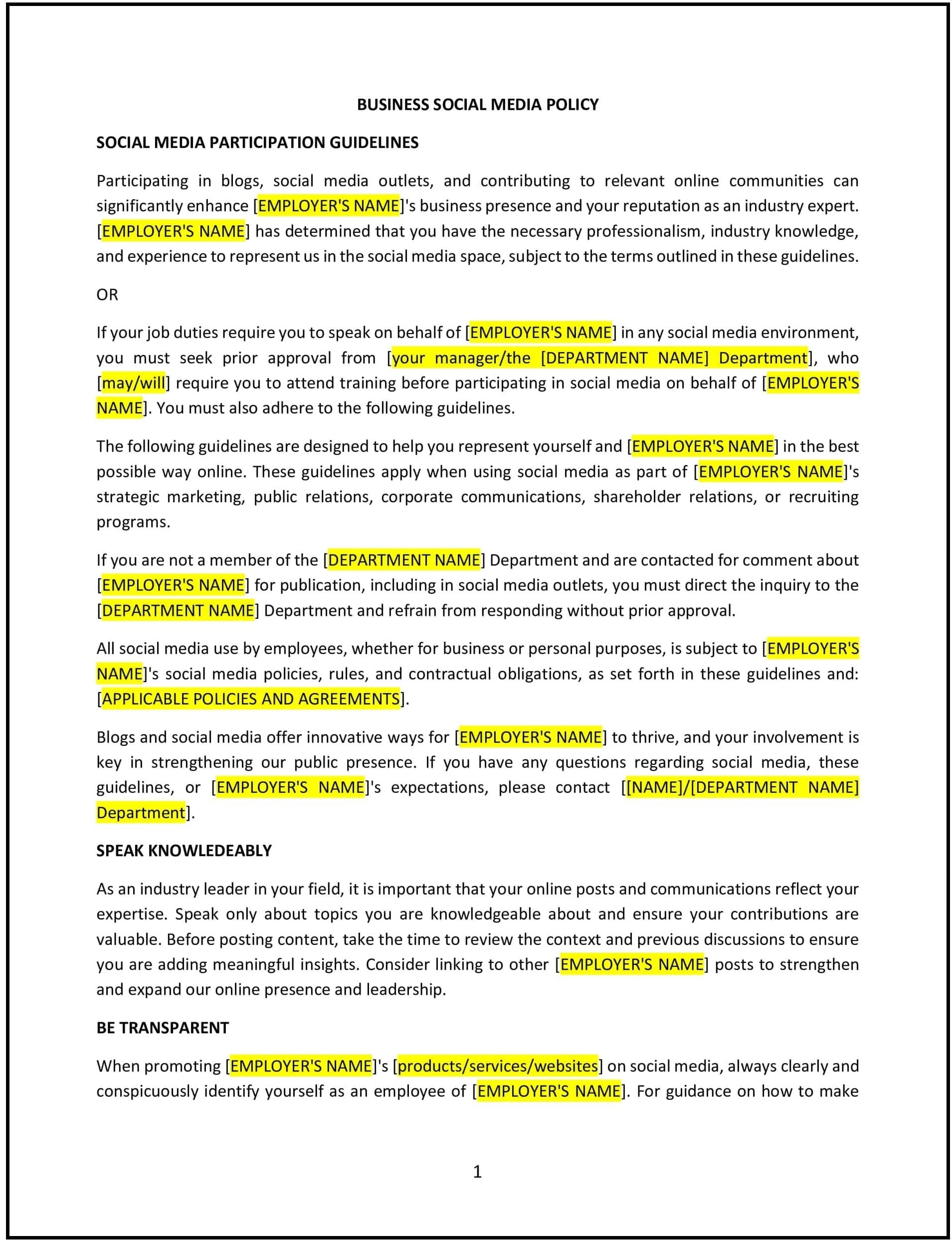Business social media policy (Massachusetts): Free template
Got contracts to review? While you're here for policies, let Cobrief make contract review effortless—start your free review now.

Customize this template for free
This business social media policy is designed to help Massachusetts businesses manage employees’ use of social media in a professional capacity. The policy outlines expectations for employees when representing the company on social media platforms, both during work hours and in their personal time. It provides clear guidelines on acceptable and unacceptable online behavior, how to protect company interests, and the company’s stance on maintaining a respectful and professional presence in digital spaces.
By adopting this policy, businesses can safeguard their reputation, prevent misuse of company resources, and ensure that employees are mindful of how they represent the company online, while complying with Massachusetts state laws and relevant regulations.
How to use this business social media policy (Massachusetts)
- Define acceptable use: Clearly outline how employees are expected to use social media in relation to their work duties. The policy should specify that employees are allowed to promote the company’s products, services, and values but must do so in a respectful and professional manner.
- Establish boundaries for personal social media use: Clarify the expectations regarding personal social media use, especially when employees identify themselves as working for the company. The policy should address how employees should handle mentioning the company on their personal accounts to avoid potential conflicts or negative publicity.
- Set confidentiality and data protection guidelines: Employees must be reminded not to share confidential company information or proprietary content on social media. The policy should reinforce that any information considered private or sensitive must not be disclosed online, even in personal accounts.
- Address online behavior and conduct: The policy should specify acceptable and unacceptable behaviors when employees are posting on social media, including prohibiting offensive language, discriminatory comments, and any form of harassment or bullying.
- Provide guidelines for engaging with the public online: The policy should address how employees should engage with customers, competitors, and the public through social media, ensuring interactions are respectful and reflect well on the company.
- Establish a reporting process: The policy should provide employees with a way to report any inappropriate online behavior or content related to the company. This could include issues like negative comments, false information, or content that does not align with the company’s values.
- Define consequences for non-compliance: The policy should clarify the consequences for failing to adhere to the social media guidelines, including potential disciplinary action such as warnings, suspension, or termination, depending on the severity of the violation.
- Ensure compliance with Massachusetts and federal laws: The policy must comply with Massachusetts state laws, including data protection and discrimination regulations, as well as federal laws governing online behavior and employee rights.
Benefits of using this business social media policy (Massachusetts)
This policy offers several benefits for Massachusetts businesses:
- Protects the company’s reputation: By outlining clear expectations for social media use, businesses can mitigate the risk of damaging comments, misinformation, or inappropriate behavior that could negatively impact the company’s reputation.
- Enhances employee awareness: The policy helps employees understand their role in maintaining a positive, professional online presence and ensures they are aware of the potential consequences of online actions.
- Reduces legal risks: The policy helps businesses comply with Massachusetts state laws and federal regulations, such as privacy and anti-discrimination laws, reducing the risk of legal actions related to social media misuse.
- Promotes a consistent company voice: Clear guidelines help ensure that employees represent the company consistently and professionally across social media platforms, reinforcing the brand's messaging and values.
- Protects company data and intellectual property: The policy helps prevent the unauthorized sharing of sensitive company information and protects intellectual property from being exposed on social media.
- Fosters a positive workplace culture: By encouraging respectful and responsible social media behavior, businesses can foster a positive work environment where employees are mindful of their digital conduct and the impact it can have on the company.
Tips for using this business social media policy (Massachusetts)
- Communicate the policy clearly: Ensure all employees are aware of the policy and understand their responsibilities when using social media, both professionally and personally. Include the policy in the employee handbook and review it during onboarding or at regular team meetings.
- Offer social media training: Provide training on how employees can effectively use social media to represent the company, including tips on appropriate content, engagement strategies, and maintaining professionalism online.
- Monitor online presence: Periodically monitor public-facing social media accounts related to the company to ensure that they align with the company’s values and represent the business positively. Address any inappropriate content or behavior quickly.
- Address issues promptly: Ensure that any issues related to social media conduct are addressed promptly, whether it’s a complaint, a negative comment, or an employee violation. The policy should include clear steps for resolving conflicts or addressing concerns.
- Review and update regularly: Periodically review the policy to ensure it remains compliant with Massachusetts state laws, federal regulations, and any changes in the company’s operations or social media strategy. Regular updates will ensure the policy stays effective and relevant.